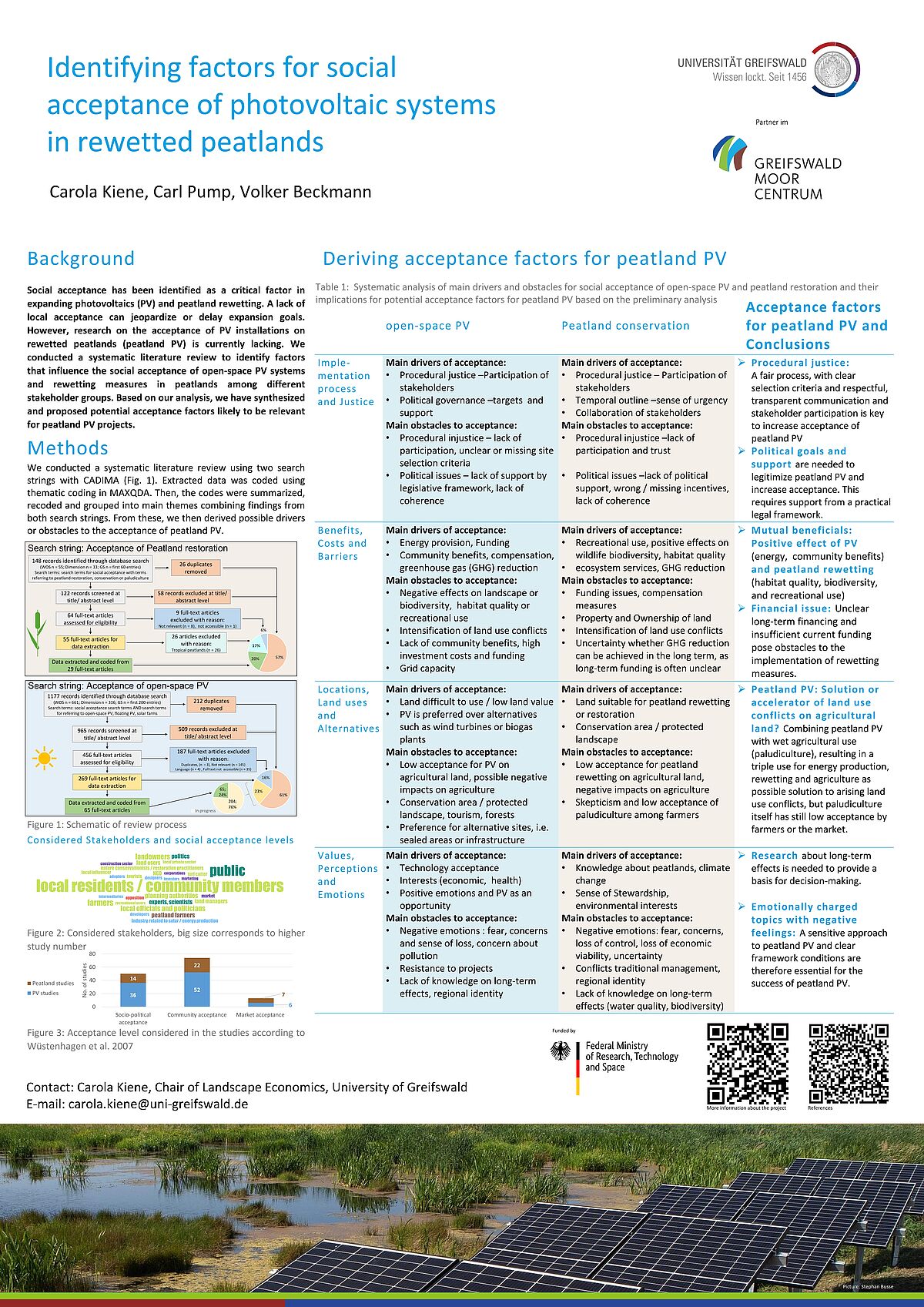Chair of Landscape Economics
Welcome to the website of the Chair of Landscape Economics!
Here you will find information on our staff, our research projects, teaching and publications of the chair.
News and dates
RRR2025 Conference - Renewable Resources from Wet and Rewetted Peatlands
The international conference on the utilization of wet and rewetted peatlands took place for the fourth time in Greifswald from September 23-26, 2025. A diverse program of sessions, poster presentations, excursions, workshops, and product exhibitions brought together research and practice. The Landscape Economics Working Group was also involved in the organization and planning and was represented with several presentations, posters, and workshops:
Vorträge:
Regina Neudert & Sandra Kleine: “Current knowledge and research gaps in agricultural science and socio-economics of paludiculture: a scoping review”
Anke Nordt & Sabine Wichmann: “Obstacles, major fields of action and financial requirements to promote implementation of paludiculture in Germany”
Carl Pump: “Analysis of Peatland-Photovoltaic: A system transition and photovoltaic project planner perspective”
Malte Zoerner: “Plant selection for paludiculture: Seeking the most productive genotypes with a high content of bioactive secondary metabolites and good suitability for cultivation The SoMoMed project – Sundew and cloudberry as medicinal plants in Paludiculture”
Poster:
Sabine Wichmann: “Update on the market of Common Reed for thatching (1990−2023)”
Michael Rühs: “Analysis of costs and carbon footprint of Paludiculture-biomass harvesting techniques by means of Monte Carlo Simulations”
Carola Kiene: “Identifying factors for social acceptance of photovoltaic systems in rewetted peatlands”
Wendelin Wichtmann: “Certification of biomass from Paludiculture”
Telse Vogel: “Analysing methods for recording machine and work processes for paludiculture procedures – a field test during Typha harvest”
Bas Spanjers: “PaludiScout.de – An information platform for harvesting machinery in Paludiculture”
Workshops:
Sabine Wichmann: "Paludiculture in the CAP: current experiences and recommendations for post-2027"
Carola Kiene: “Peatland-PV: Integrating Diverse Perspectives for Holistic Research”
Peatland-PV: New Research Findings on Public Acceptance of Photovoltaics on Peatlands
At the AgriVoltaics World Conference 2025, Carola Kiene and Carl Pump presented new research findings on the social acceptance of photovoltaic systems on rewetted peatlands ("Peatland-PV").
Social Acceptance of Peatland-PV: Approach and Results
The systematic literature review included 29 studies on peatland rewetting and 64 studies on open-space photovoltaic systems. The goal was to identify acceptance factors for both topics and derive key criteria for the successful implementation of future peatland PV projects.
The preliminary results highlight the following acceptance factors for Peatland-PV:
- Procedural fairness: Transparent decision-making processes, clear selection criteria, and the inclusion of relevant stakeholders are crucial for social acceptance of Peatland-PV projects.
- Political Support: A legally sound framework and clear objectives are necessary to legitimize Peatland-PV.
- Mutual Benefit: Benefits for climate, biodiversity and local recreation strengthen local social acceptance.
- Uncertainty: Unclear long-term funding and limited resources hinder the implementation of rewetting measures.
- Land Use Conflicts: Combining PV with wet agriculture (“Paludi-PV”) has potential to address land use conflicts, but has not yet been widely adopted
- Research Needs: Long-term effects of peatland PV are still insufficiently investigated.
Peatland-PV is linked to emotionally charged topics and therefore requires a sensitive approach.
Conclusion: Peat PV requires clear framework conditions and sensitive handling in order to be socially accepted and successful in the long term.
Conference Highlights:
At the AgriVoltaics World Conference 2025 in Freiburg, over 500 participants from 35 countries met to discuss current developments in agriphotovoltaics (agri-PV) – a technology that combines agriculture and renewable energy on the same land. The presentation contributed to the visibility of peatland PV and social science research in the field of renewable energy. The interest in peatland PV was particularly positive. The "Social Sciences" session emphasized the social acceptance of agri-PV. Carola Kiene moderated the session together with Alexis Pascaris (NREL) and promoted international exchange.
The poster was also exhibited at the 2025 Solar Farm Summit in Chicago (August 4-7th), where over 3,500 participants were expected.
The research was carried out as part of the “MoorPower” project.
Carl Pump also presented the current status quo of agri-PV in Germany at the conference. A database was developed for this purpose at Fraunhofer ISE. Further information can be found here: https://agri-pv.org/en/events--network/agrivoltaic-facilities-in-germany/
Paludi4All: project kick-off 11.-12.03.2025 in Berlin

In March 2025, representatives from seven partner organisations and five European countries met in Berlin for the Paludi4All project kick-off to start the joint work, including the collaboration with sister paludiculture demonstration projects Palus Demos and PaluWise. The EU-funded project Paludi4All investigates the socio-economic, climate and environmental aspects of paludiculture (2025-2029). The Landscape Economics working group focuses on markets & value chains and economic incentives for paludiculture. Further information: Press release (FNR)
Final meeting of the GRASSWORKS project in Berlin on January 21st, 2025
The final meeting of the GRASSWORKS project will take place on January 21 under the motto “Developing sustainable grassland ecosystems: thinking together about agriculture, nature conservation and society”. GRASSWORKS is investigating what leads to successful grassland restoration in Germany from a social and ecological perspective. Participation is possible in presence and online. Please register by January 6, 2025.
Further information here.
Study on peatland PV published and honoured with poster award
What are the strengths, weaknesses, opportunities and threats of Peatland PV, the combination of open-space PV with the rewetting of peatlands on the same site? And what strategies can be derived for the implementation of Peatland PV in north-east Germany and beyond? These questions are at the centre of a recently published study (Seidel et al. 2024). The work is based on ten expert interviews conducted in 2022, a qualitative content analysis and SWOT and TOWS analyses.
The study follows an exploratory approach, as no Peatland PV plant with intended rewetting has yet been realised in Germany. Strengths, weaknesses, opportunities and threats of Peatland PV were identified in all four dimensions analysed - ecological, technological, economic and legal. Overall, the experts rated the opportunities higher than the threats. The consensus was that pilot plants and monitoring are needed to clarify open questions.
Melissa Seidel also presented the results of the study, which are based on her bachelor's thesis, at the international Landscape 2024 conference in Berlin and was honoured with the Poster Award in the Technologies category.
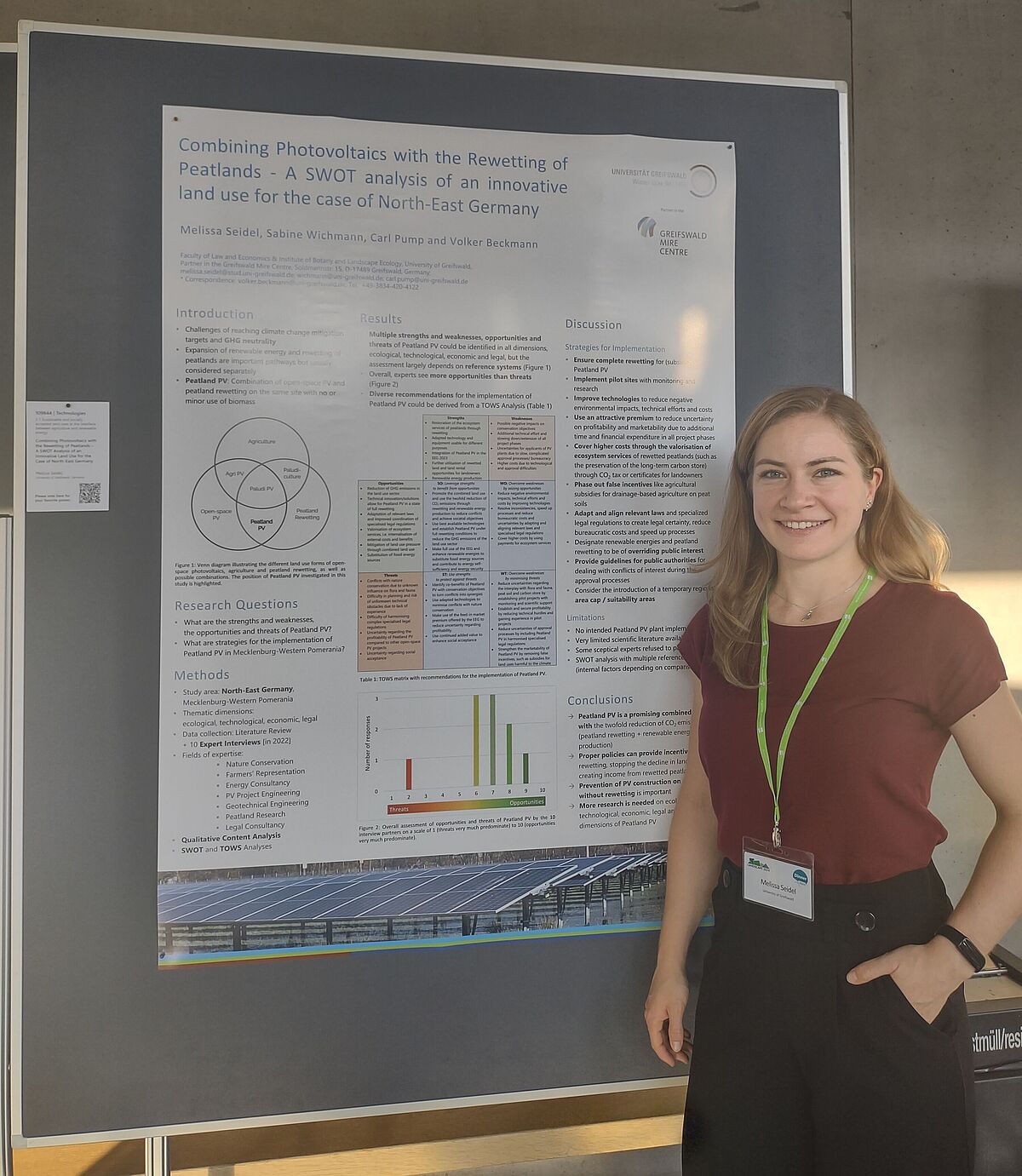

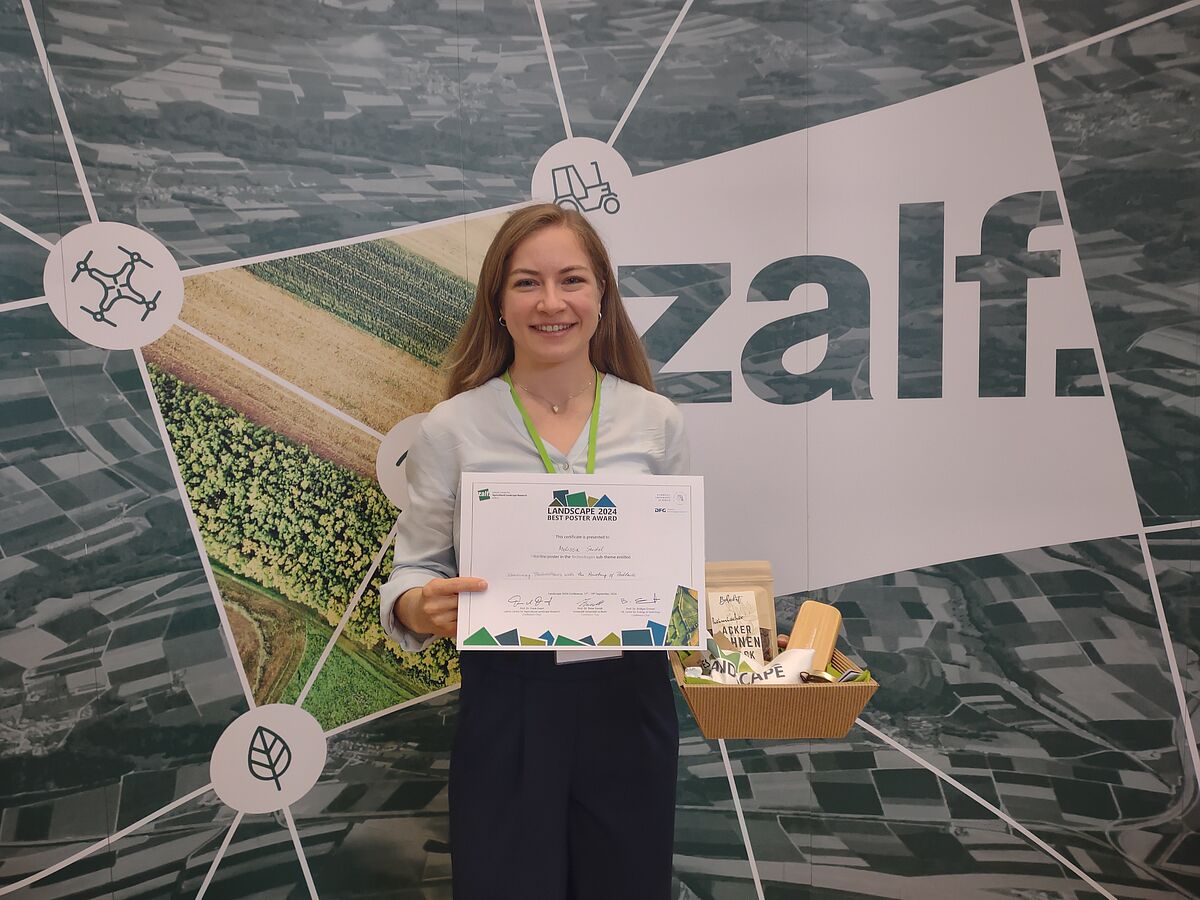
PaludiNetz launch event “25 years of paludiculture”

10-12.06.24, Braunschweig
The Thünen Institute, the University of Greifswald and the Michael Succow Foundation celebrated the launch of nine long-term projects on peatland soil protection with a festive event. Around 200 peatland soil experts from Germany, the Netherlands, Switzerland and Sweden took part in the conference. The Federal Ministry for the Environment, Nature Conservation, Nuclear Safety and Consumer Protection and the Federal Ministry of Food and Agriculture are funding the ten-year pilot projects as well as model and demonstration projects and the PaludiZentrale, which work together in the PaludiNetz.
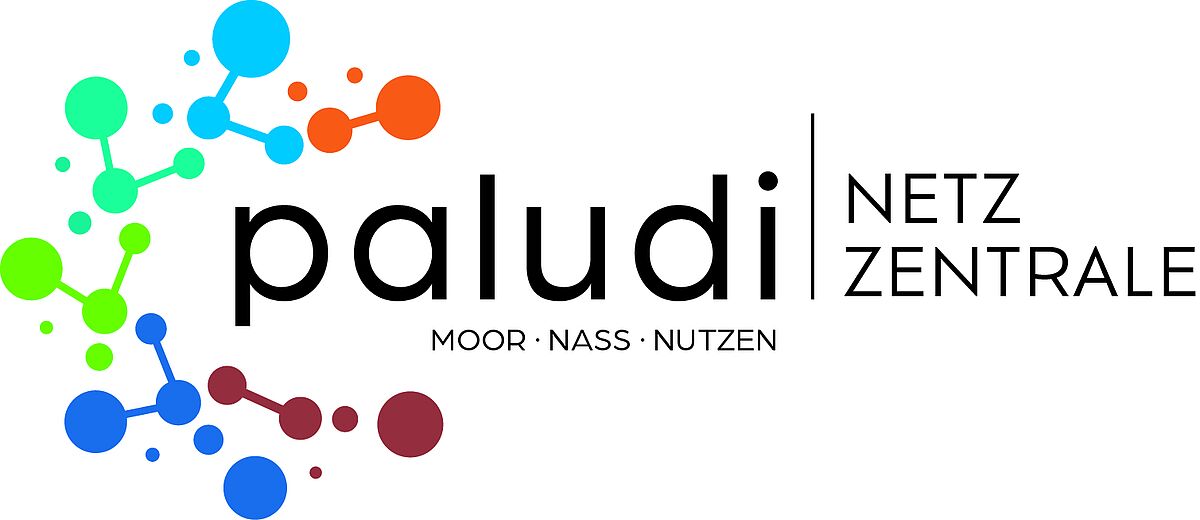
Peatland-PV (2024-2026) project has startet
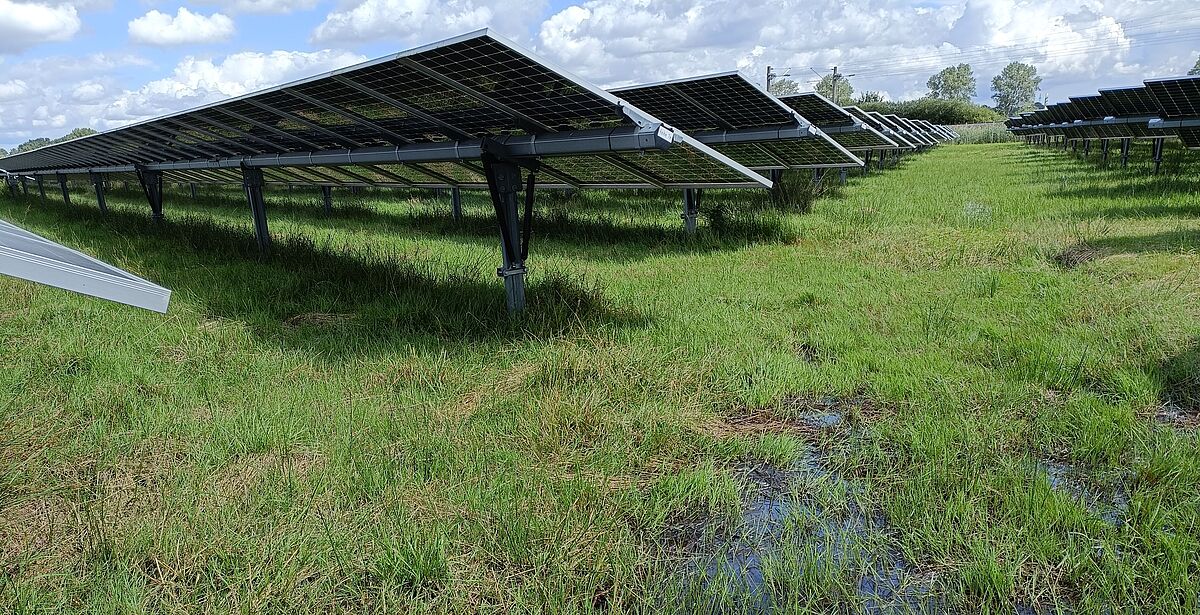
What ecological and economic effects result from the combination of peatland rewetting and photovoltaics? This key research question is being investigated by the Joachim Herz Foundation-funded project "Climate and peatland protection through the combination of photovoltaics and peatland rewetting (peatland PV)", which was launched in January 2024. The rewetting of peatlands is the most effective measure to reduce greenhouse gas emissions from drained peatlands. However, previous forms of agricultural use will no longer be possible after rewetting. In addition to the site-adapted utilisation of wet or rewetted peatlands (paludiculture), the construction of ground-mounted photovoltaic systems could also represent a new economically attractive utilisation option. Since the Renewable Energy Sources Act 2023, peatland PV systems have already been eligible for funding as "special solar systems". However, there is still a considerable need for testing and research in order to be able to comprehensively assess the impact of the installation of photovoltaic systems on peatland soils to be rewetted for this purpose, particularly with regard to peat conservation and climate balance, water balance and biodiversity, but also with regard to the economic incentive function towards more rewetting of previously drained, agriculturally utilised peatlands. This is precisely where the Moor-PV project comes in and attempts to close the knowledge gaps.
"PaludiZentrale" project (2023-2033) has started
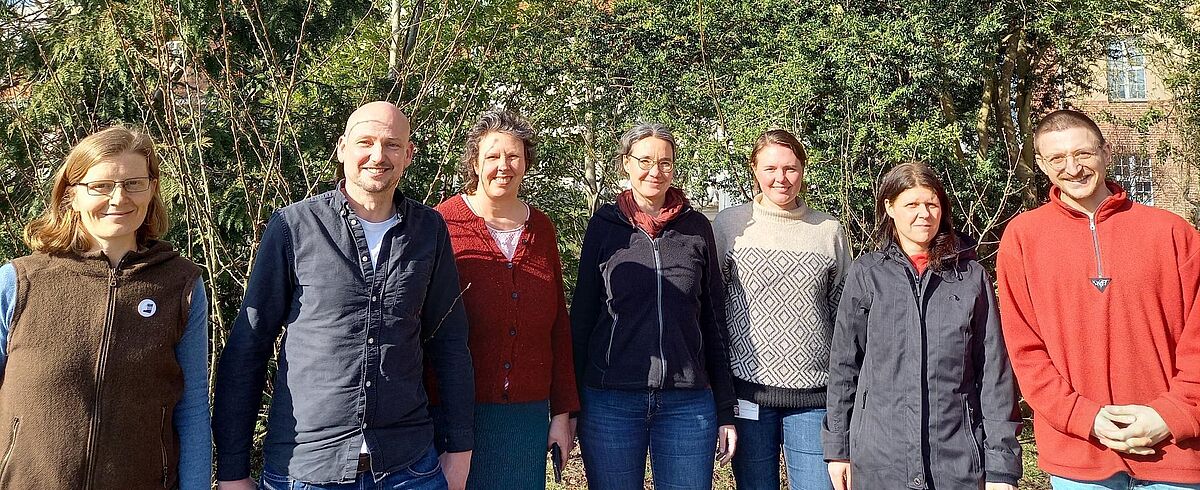
With the PaludiZentrale project, the Federal Ministry of Food and Agriculture (BMEL) is funding a ten-year joint project to support nationwide model and demonstration projects on peatland protection and paludiculture. The tasks are overarching coordination, harmonisation of data collection, scientific synthesis and the establishment of a paludiculture network with the organisation of nine topic-specific working groups. The Landscape Economics working group is responsible for the work packages "Planning, establishment and crop production" (WP6), "Utilisation and marketing" (WP7), "Business management" (WP8) and "Socioeconomics" (WP9). The team will be complete by 01.02.2024.
Team-building workshop of the Landscape Economics working group at the Biological Station Hiddensee
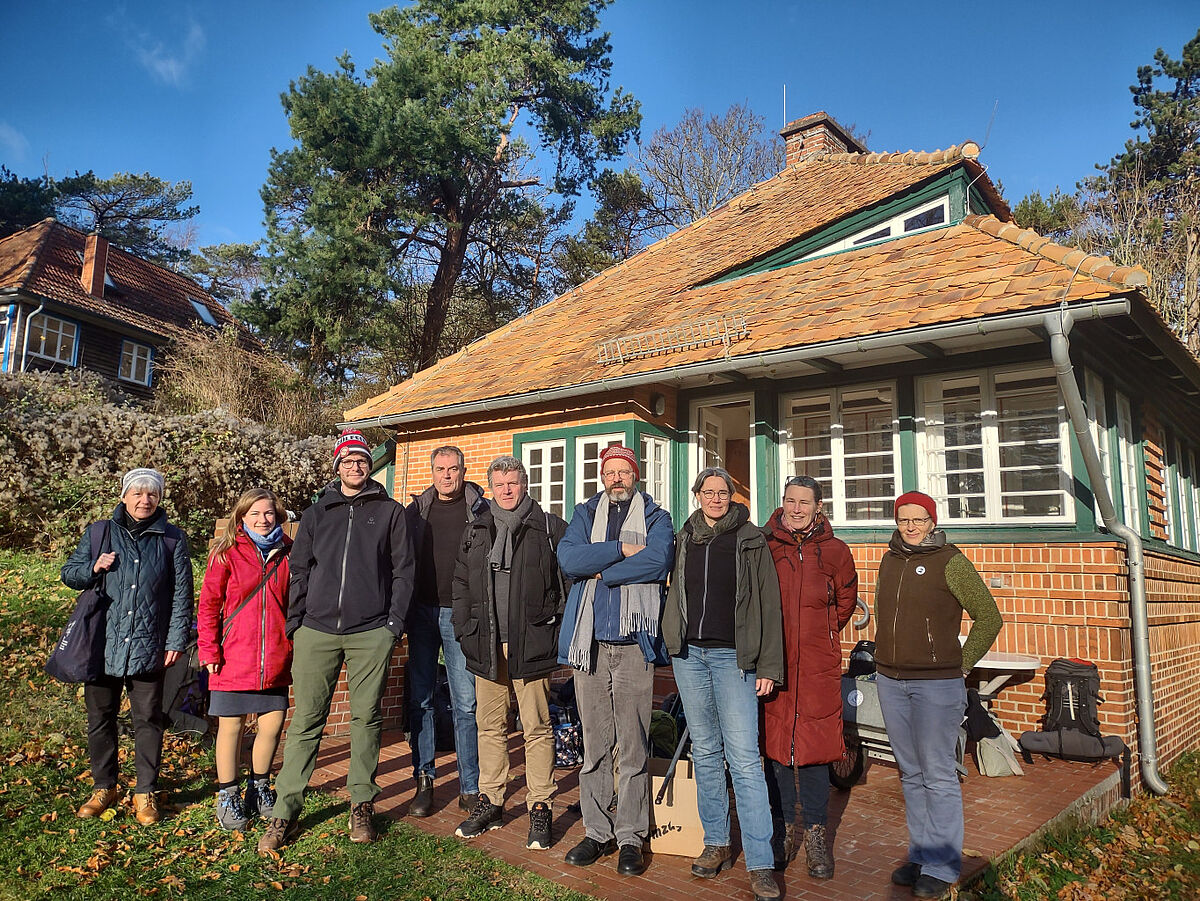
The Landscape Economics working group met for a team-building workshop on the island of Hiddensee off the coast of Rügen at the end of November 2023. The Biological Station of the University of Greifswald is located in the small village of Kloster on the almost 17-kilometre-long island. The group was able to stay in the cozy doctoral house here. After a lecture by Dr. Sven Dahlke on the history of the island of Hiddensee, the group was able to put their newly acquired knowledge to the test immediately afterwards in a special board game about the island. The weekend program included a visit to the beach and a trip to the Dornbusch lighthouse as well as relaxed cooking and board game evenings. What's not to forget, the weekend was right between the last autumn storms and an icy onset of winter, so apart from hail and wind, there were even a few hours of sunshine.
Final conference of the Vorpommern Connect project on July 03, 2023
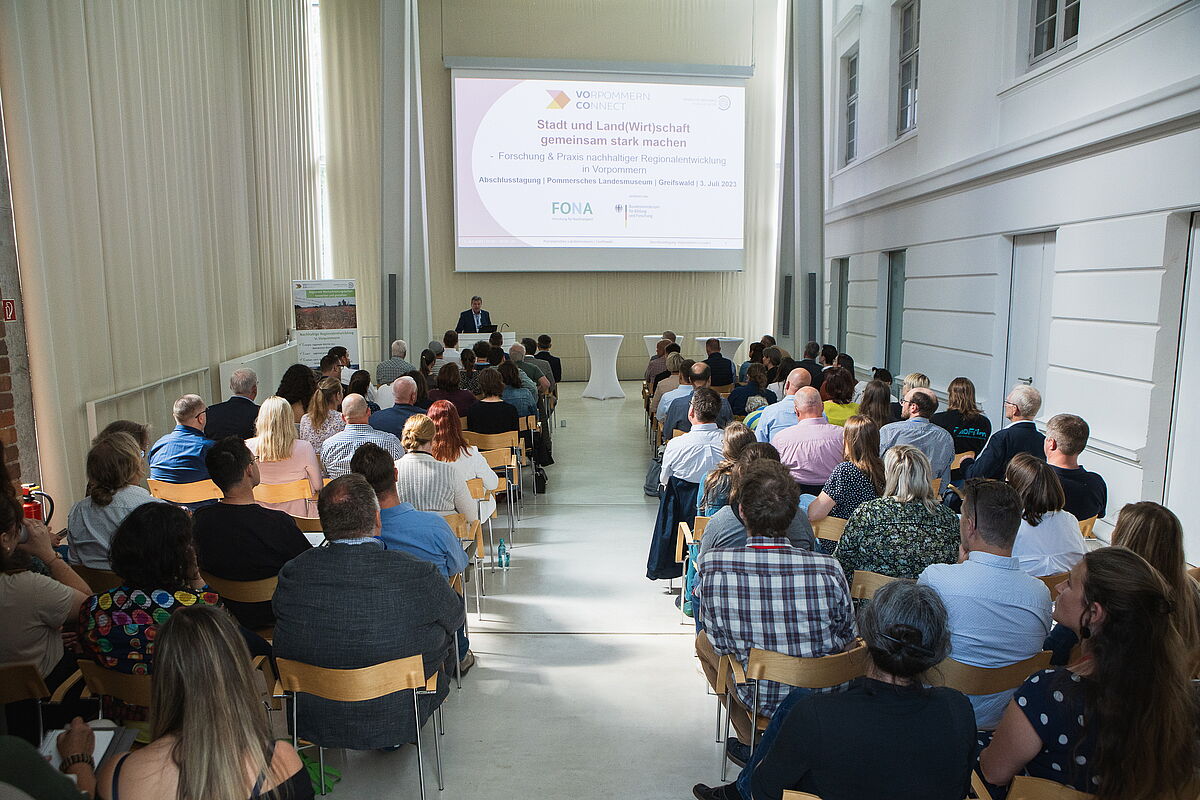
The Vorpommern Connect project is coming to an end. On July 3, 2023, the final conference took place in Greifswald on the premises of the Pomeranian State Museum.
There were not only scientific contributions from the project, but also specifically from practical partners of the project. This is precisely the approach that has been pursued over the last five years: networking stakeholders in the region and encouraging them to engage in joint exchange and discourse.
Further information and the presentations can be found under the following LINK.
Dr. Sabine Wichmann receives the Sustainability Award 2022 of the University of Greifswald
The rewetting of drained peatland sites is now also enshrined in the German government's National Peatland Conservation Strategy. Our colleague Dr. Sabine Wichmann dealt with the economic efficiency of paludiculture, i.e. the cultivation of wet sites, as part of her dissertation. On 21st of December 2022, she won this year's Sustainability Award of the University of Greifswald. On behalf of the Chair, we congratulate Sabine wholeheartedly and look forward to further research results from her.
Further information can be found under the following LINK.
Water buffalo management on rewetted peatland sites
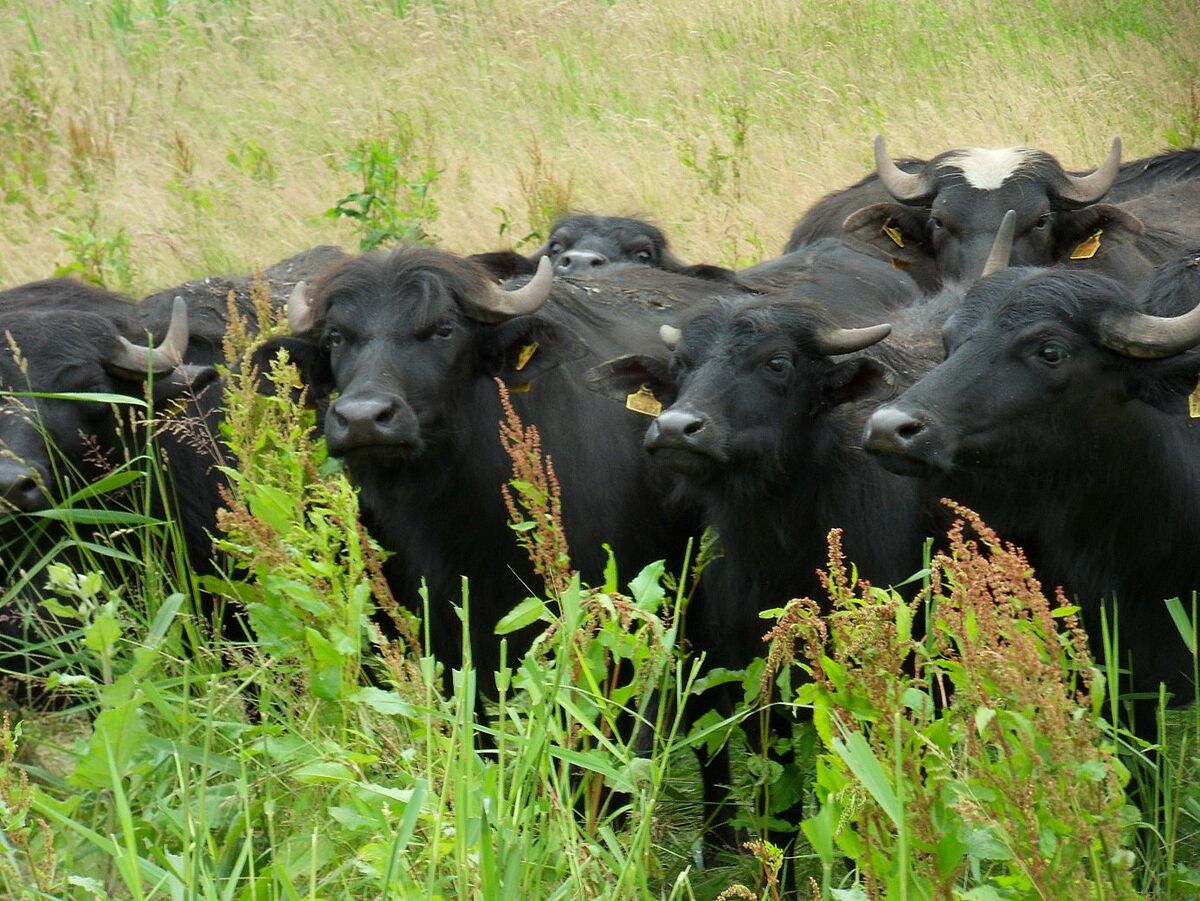
Alongside forests, peatlands are a major carbon store. However, when peatlands are drained for agricultural use, much of the stored CO2 is emitted. A peatland loses about 1 cm in thickness per year of drainage. If rewetting takes place, the peatland gains approx. 1 mm in thickness per year under good conditions. This clearly illustrates the urgent need for action in the field of peatland conservation and shows that rapid action on the part of humans is necessary for the conservation and preservation of peatlands. A number of projects in the peatland-rich federal states such as Mecklenburg-Western Pomerania are already addressing this issue and trying to find solutions in cooperation with nature and regional farmers.
One of these projects is investigating the possible agricultural use of rewetted areas by keeping water buffalos. You can find an interesting NDR report on this topic under following LINK.
Urban-Rural-Plus symposium on 15th of September 2022 at the University of Rostock
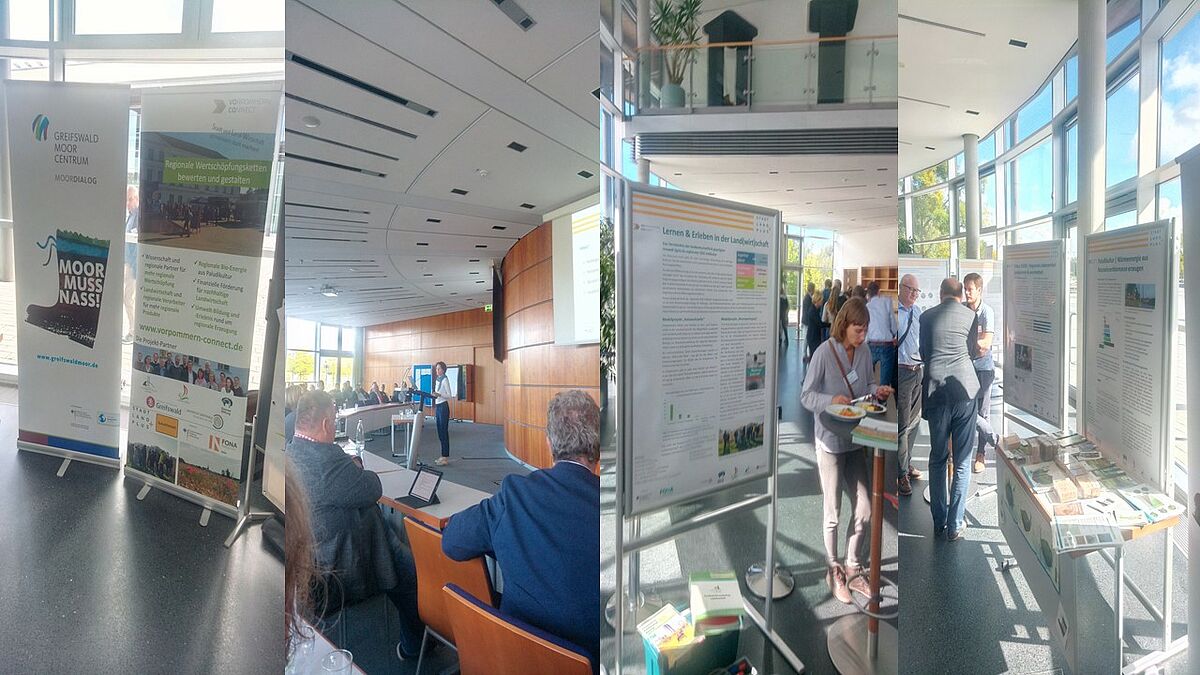
GOOD URBAN-RURAL-RELATIONS FOR SUSTAINABLE DEVELOPMENT IN MV
At the symposium in Rostock, we were treated to a number of informative and exciting presentations. In addition to the presentations, the discussions with regional stakeholders were particularly enriching for us and the VorpommernConnect project.
If you are interested in individual presentations, please take a look at the conference proceedings under the following link.
An informative video of the event has also been produced.
The 5th International Workshop on Archetype Analysis in Sustainability Research
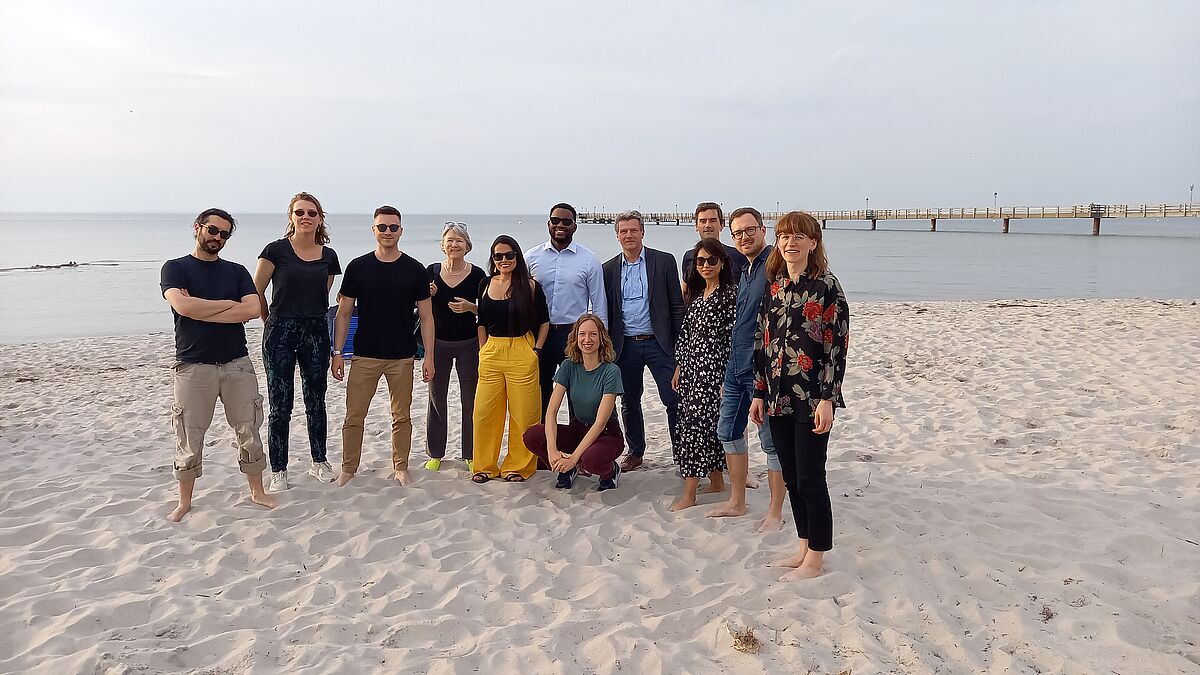
The 5th International Workshop on Archetype Analysis in Sustainability Research was successfully conducted in Greifswald from 18-20 May 2022. The participants who joined in Greifswald and online were from a range of countries including Sweden and the US. Also new researchers joined the workshop, further extending the international network of archetype research. The participants presented and discussed ongoing research particularly on the Sustainable Development Goals, methodological advances and emerging topics in archetypes research.
New Book: Transitioning to Sustainable Life on Land
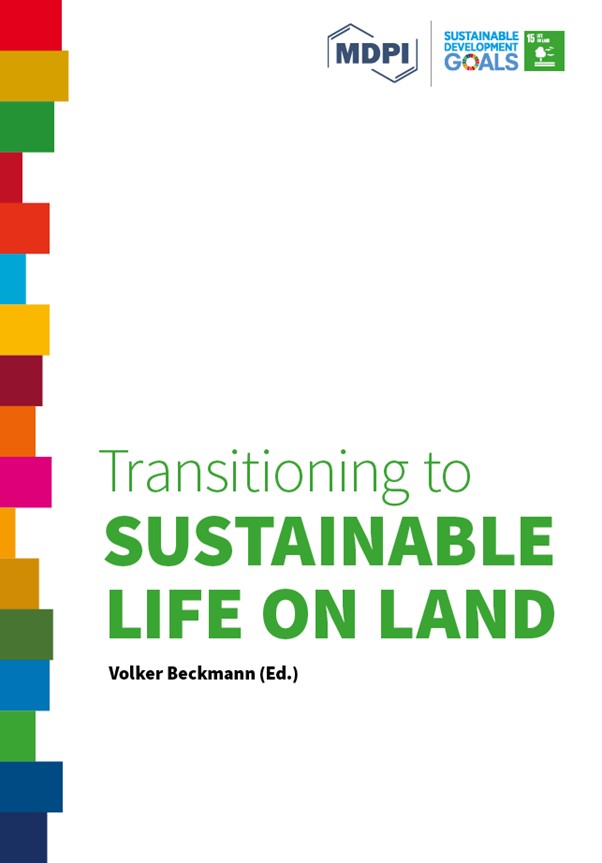
Please check the new MDPI open access book Transitioning to Sustainable Life on Land edited by Prof. Dr. Volker Beckmann. Fifteen outstanding contributions reflect on the political, economic, and societal transformations needed to achieve the United Nation’s Sustainable Development Goal 15, which calls for the protection, restoration, and promotion of sustainable use of terrestrial ecosystems.
Final workshop BMBF-project IliLive October 07th to 08th 2021
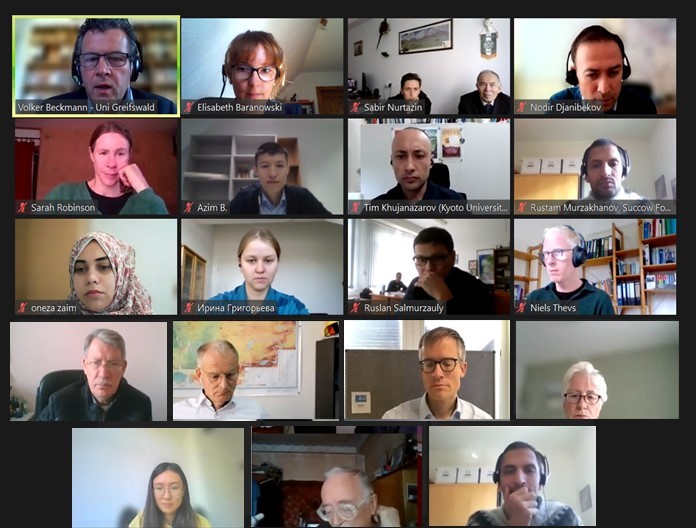
The objective of the BMBF-project “Livestock farming in the Ili-Delta under varied water flow - effects on food security and adaption strategies” (Ili-Live) is an assessment of threats to livestock farming systems and, therefore, to the food security in the Ili-Delta under varying water inflow. The research project aims to develop appropriate measures in the field of water, pasture and fodder management at operational, local as well as regional level to reduce these threats.
The project started in November 2018. After the kick-off workshop in February at Al-Farabi Kazakh National University (www.kaznu.kz) in Almaty, extensive fieldwork was carried out in the Ili Delta as the main study area and in the Amu Darya Delta as a comparative region during the summer 2019. Next to experienced researchers, we integrated junior scientists as well as bachelor and master students from University of Greifswald, Al-Farabi University, and Kazakh National Agrarian University. Unfortunately, the project stopped due to the corona restrictions in the following year 2020. The last face-to-face meeting of the project consortium was at the mid-term workshop at the University of Greifswald in October 2019. Planned study visits of Kazakh Matser students and young scientists, and fieldwork in the delta regions could not take place or had to be organized differently. Fortunately, our project partners were able to complete investigations and data collections in the delta regions during the summer of 2021.
In October 2021, the final workshop took place digitally as a Zoom event with an international audience. On the first day, the project team presented research results. Then, Prof. Martin Petrick from the University of Giessen opened the second day with a keynote speech on questions about livestock in Kazakhstan. Following recommendations for the water, pasture, and fodder management at the local and regional level were discussed by the participants, including Ardakuly Aibar (Chief specialist, Agricultural Department Balkhash district), Vladimir Levin (Director NGO Farmer of Kazakhstan Foundation), Alexander Barnewirtz (Team leader German-Kazkah Dialogue on Agricultural Policy), and many more.
The event concluded with a networking session. Scientists, as Prof. Sabir Nurtazin (Al-Farabi University), Prof. Kristina Toderich (ICBA-CAC), Dr. Sarah Robinson (University of Giessen), Dr. Nodir Djanbekov (IAMO), Makhmud Shaumarov (FAO), and Rustam Murzakhanov (Succow Foundation) gave a speech on their current and planned research projects and activities. Overall, it was a successful project completion.
We would like to thank the participants for their valuable contributions and interesting discussions!
Furthermore, we would like to thank our project partners Prof. Sabir Nurtazin, Al-Farabi University, Prof. Kuat Nurgazy, Kazakh Agricultural University, Prof. Kristina Toderich, International Center for Biosaline Agriculture (ICBA-CAC), Dr. Niels Thevs, Agroforestry Center, and the business collaborate Merigali Kassymbekov for fruitful cooperation over many years.
AgoraNatura launches: Germany's first independent marketplace for certified nature conservation projects
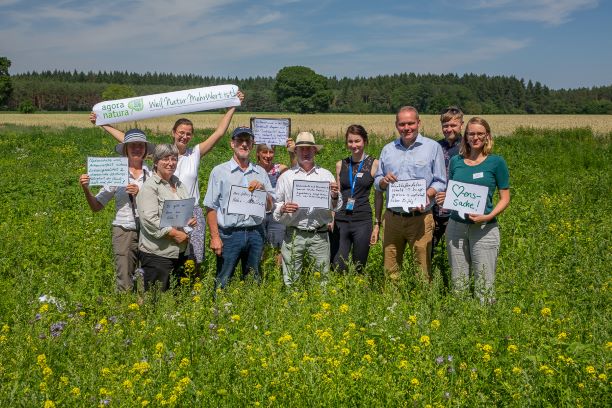
Targeted donations from committed private individuals or environmentally conscious companies can support projects like this one in Prignitz.
Contact
Chair of Landscape Economics
Chairholder
Prof. Dr. Volker Beckmann
Office hours: only after agreement
Secretary's office:
Imma Eckardt
ls-landschaftsoekonomieuni-greifswaldde
Office hours: Monday - Thursday: 10:00 - 12:00
Soldmannstraße 15
17487 Greifswald
Telefon +49 3834 420 4115
Telefax +49 3834 420 4107
Topics for theses
If you are interested, please contact the person responsible, who can be found in the topic description.
Examination and test dates
You can find the dates here
Important information on the exam results
Exam results may not be announced by telephone or e-mail for data privacy reasons!
It is possible to send the result by post, provided that a stamped and addressed envelope (A4 format) has been sent. Please note, however, that the right to subsequent correction does not apply.

